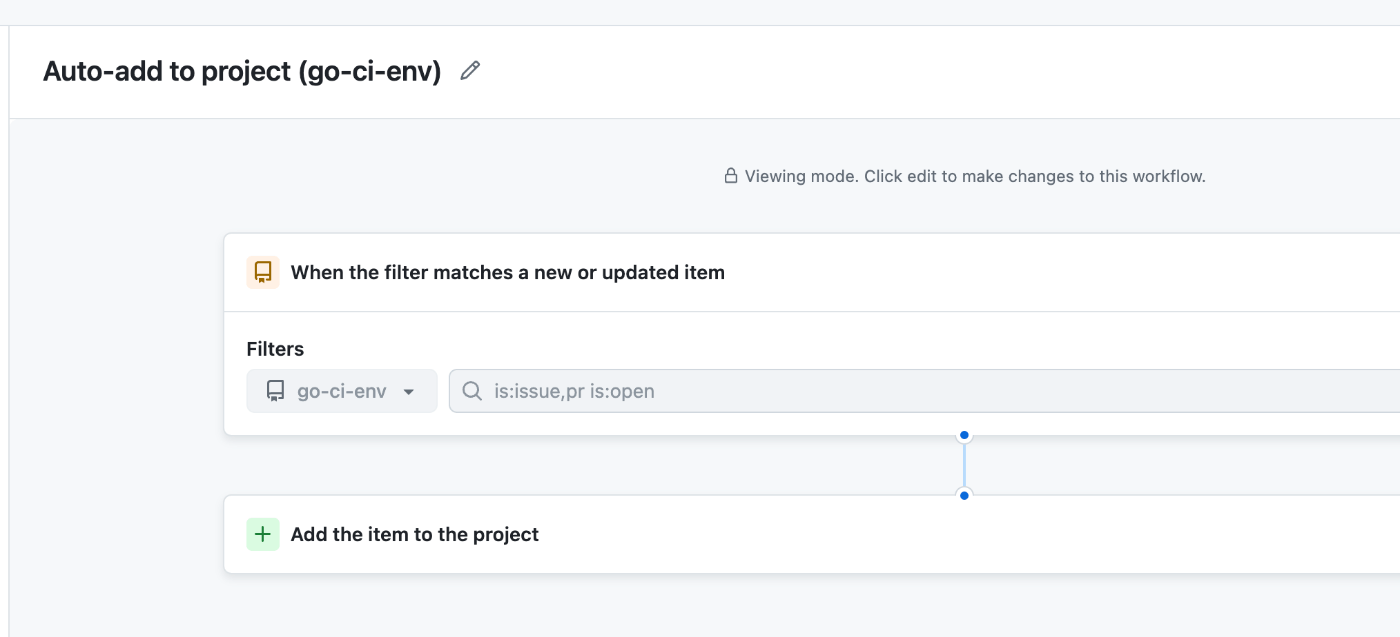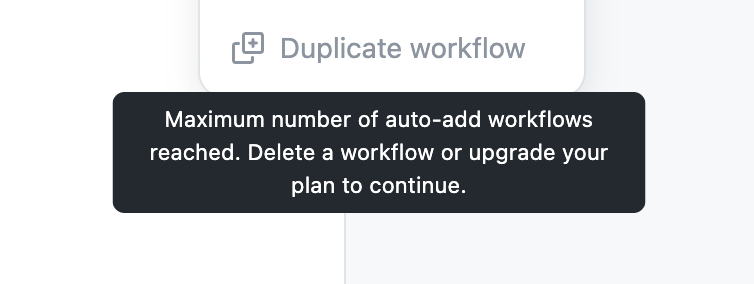https://github.com/suzuki-shunsuke/ghproj
Add GitHub Issues and Pull Requests to GitHub Projects
https://github.com/suzuki-shunsuke/ghproj
cli github github-projects oss
Last synced: 7 days ago
JSON representation
Add GitHub Issues and Pull Requests to GitHub Projects
- Host: GitHub
- URL: https://github.com/suzuki-shunsuke/ghproj
- Owner: suzuki-shunsuke
- License: mit
- Created: 2024-07-21T07:21:18.000Z (10 months ago)
- Default Branch: main
- Last Pushed: 2025-04-30T21:35:10.000Z (7 days ago)
- Last Synced: 2025-04-30T23:46:56.822Z (7 days ago)
- Topics: cli, github, github-projects, oss
- Language: Go
- Homepage:
- Size: 316 KB
- Stars: 12
- Watchers: 1
- Forks: 1
- Open Issues: 8
-
Metadata Files:
- Readme: README.md
- Funding: .github/FUNDING.yml
- License: LICENSE
Awesome Lists containing this project
README
# ghproj
[](https://raw.githubusercontent.com/suzuki-shunsuke/ghproj/main/LICENSE) | [Install](INSTALL.md) | [Usage](USAGE.md)
Add GitHub Issues and Pull Requests to GitHub Projects.
## Motivation
I manage a lot of OSS projects, so I have to handle a lot of issues and pull requests.
So I want to manage them using a GitHub Project.
I've developed this tool to gather issues and pull requests of all my OSS in a single GitHub Project.
By executing this tool periodically by [GitHub Actions schedule event](https://docs.github.com/en/actions/using-workflows/events-that-trigger-workflows#schedule), you can add issues and projects to GitHub Projects automatically.
## Blog Post
- [Japanese](https://zenn.dev/shunsuke_suzuki/articles/add-github-issue-pr-to-project)
- [English](https://dev.to/suzukishunsuke/pull-together-github-issues-and-pull-requests-across-repositories-to-github-projects-automatically-a87)
## Environment variables
- `GITHUB_TOKEN`: (Required) GitHub access token
- `GHPROJ_CONFIG`: Configuration file path
- `GHPROJ_CONFIG_TEXT`: Configuraiton content. This is useful if you want to manage the configuration in a GitHub Actions Workflow file
## GitHub Access token
ghproj needs a GitHub access token.
You need to pass a token via environment variable `GITHUB_TOKEN`.
There are two options.
1. (Recommendation) If you use GitHub **Organization** Project, you can use a `GitHub App`
1. If you use GitHub **User** Project, you can use a `classic personal access token`
`GitHub App` is much safer than `classic personal access token`, so we recommend the option 1.
GitHub Actions token is unavailable to manage GitHub Projects.
fine-grained personal access token is unavailable because it doesn't support GitHub Projects.
https://github.com/orgs/community/discussions/36441
> There are also some APIs that do not yet support the fine-grained permission model, that we'll be adding support for in time:
> - Packages
> - Projects
> - Notifications
GitHub App is unavailable for GitHub User Projects because the permission of GitHub User Project isn't supported.
### 1. GitHub App
Permissions:
- `Repository permissions`: `metadata: read-only`
- `Organization permissions`: `Projects: Read and write`
Installed repositories:
Please install the GitHub App into only a repository where `ghproj` is executed via GitHub Actions.
If you want to handle issues and pull requests of private repositories, permissions `Pull Requests: read-only` and `Issues: read-only` are also necessary, and you need to install the GitHub App into repositories.
### 2. classic personal access token
The scope `read:org` and `project` are required.
## Configuration
`\.?ghproj\.yaml`
e.g.
```yaml
entries:
- query: |
is:open
archived:false
-project:suzuki-shunsuke/5
-label:create
owner:szksh-lab
owner:lintnet
expr: |
(! Item.Repo.IsFork) &&
(Item.Title != "Dependency Dashboard") &&
! (Item.Repo.Name startsWith "homebrew-") &&
! (Item.Repo.Name startsWith "test-")
project_id: PVT_kwHOAMtMJ84AQCf4
```
- `entries`: The list of entries.
Each entry has the following fields:
- `project_id` (string, required): GitHub Project id which issues and pull requests are added. You can get your project id using GitHub CLI `gh project list`
```sh
gh project list
```
- `action`: For now, only `archive` is supported. If `action` is `archive`, the project items are archived. If `archive` is set, `query` is unavailable
- `query`: A query to search issues and pull requests which are added to a GitHub Project.
If `action` is `archive`, `query` is unavailable.
[`query` is used as GitHub GraphQL API's `search` query's `query` argument](https://docs.github.com/en/graphql/reference/queries#search)
- `expr`: An expression to filter the search result. [expr-lang/expr](https://github.com/expr-lang/expr) is used. The expression is evaluated per item. The evaluation result must be a boolean. If the result is `false`, the item is excluded. `expr` is optional
`Item`:
```json
{
"Title": "issue or pull request title",
"Repo": {
"Owner": "repository owner name",
"Name": "repository name",
"IsArchived": false,
"IsFork": false
}
}
```
## Archive items
You can archive items by `ghproj add` command.
1. Add an entry with `action: archive`
ghproj.yaml
```yaml
entries:
- expr: |
Item.Repo.IsArchived
action: archive
project_id: PVT_kwHOAMtMJ84AQCf4
```
2. Run `ghproj add`
```sh
ghproj add
```
Unfortunately, GitHub GraphQL API doesn't support searching items using query.
So the setting `query` is unavailable.
Instead, ghproj lists all items in a given project and filters them by an expression written in [expr](https://github.com/expr-lang/expr).
The expression is evaluated by item, and the item is archived if the evaluation result is `true`.
e.g. Archive items if repositories are archived:
```yaml
- expr: |
Item.Repo.IsArchived
```
If `expr` isn't set, all items are archived.
In the expression, a variable `Item` is available.
`Item`:
```json
{
"State": "CLOSED",
"Title": "issue or pull request title",
"Labels": ["enhancement"],
"Open": false,
"Author": "octokit",
"Repo": {
"Owner": "repository owner name",
"Name": "repository name",
"IsArchived": false,
"IsFork": false
}
}
```
### JSON Schema
- [ghproj.json](json-schema/ghproj.json)
- https://raw.githubusercontent.com/suzuki-shunsuke/ghproj/refs/heads/main/json-schema/ghproj.json
If you look for a CLI tool to validate configuration with JSON Schema, [ajv-cli](https://ajv.js.org/packages/ajv-cli.html) is useful.
```sh
ajv --spec=draft2020 -s json-schema/ghproj.json -d ghproj.yaml
```
#### Input Complementation by YAML Language Server
```yaml
# yaml-language-server: $schema=https://raw.githubusercontent.com/suzuki-shunsuke/ghproj/refs/heads/main/json-schema/ghproj.json
```
## Run ghproj by GitHub Actions
- [GitHub Actions Workflow](https://github.com/szksh-lab/.github/blob/main/.github/workflows/update-project.yaml)
- [Configuraition](https://github.com/szksh-lab/.github/blob/main/ghproj.yaml)
- [GitHub Project](https://github.com/orgs/szksh-lab/projects/1)
The workflow is executed periodically by [GitHub Actions schedule event](https://docs.github.com/en/actions/using-workflows/events-that-trigger-workflows#schedule), and issues and pull requests are added to the GitHub Project.
## Comparison
There are several other ways to add issues and pull requests to GitHub Projects.
1. [built-in automation](https://docs.github.com/en/issues/planning-and-tracking-with-projects/automating-your-project/using-the-built-in-automations)
1. GitHub Actions' issues and pull requests events
### 1. built-in automation
Using built-in automation, you can add issues and pull requests to GitHub Projects wihout codes, but there are several drawback.
1. You have to create a workflow per repository. This is bothersome

2. You can create only five (this limit seems to depend on the plan) workflows, which means you can handle issues and pull requests of only five repositories

### 2. GitHub Actions' issues and pull requests events
You can run GitHub Actions workflows via issues and pull requests events and add them to GitHub Projects.
https://docs.github.com/en/issues/planning-and-tracking-with-projects/automating-your-project/automating-projects-using-actions
GitHub provides an official action for this.
https://github.com/marketplace/actions/add-to-github-projects
The drawback of this approach is that you have to add workflows to all repositories you want to handle.
You have to maintain those workflows. This is bothersome.
And you have to pass secrets to all workflow runs, which means you have to manage secrets properly.